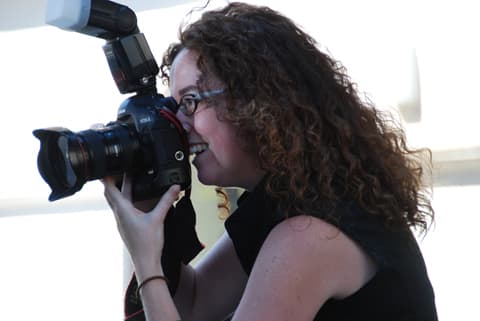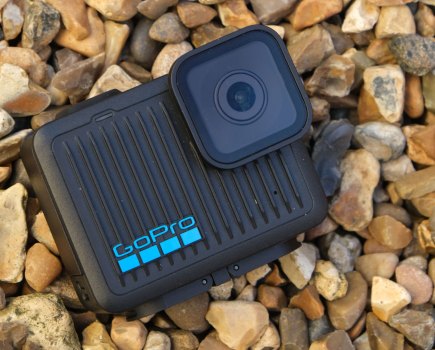Photojournalist Jess Hurd, covering a separate demonstration in London [Photo credit: C Cheesman]
The photographers took legal action against Sussex Police, arguing there had been unlawful use of legislation against the photographers who had been covering a far-right demonstration.
They were among a group of nine journalists travelling in a minibus to the March for England demonstration in Brighton, when police pulled the vehicle over.
They showed their press cards and informed the police officers they were not part of the protest, according to the National Union of Journalists (NUJ) which said seven journalists were searched under Section 60 of the Terrorism Act and Section 60AA of the Public Order Act, on 21 April 2013.
Human rights lawyer Jules Carey, of Bindmans LLP, who represented the photographers, said: ‘The right to uninhibited reporting on demonstrations is as central to the right to protest, as the demonstrations are themselves.
‘The police clearly got it wrong on this occasion, but at least they have now acknowledged the vital work of journalists at demonstrations in a fulsome apology, and paid the journalists compensation for the ordeal they endured while carrying out their professional duties.’
Among those stopped was photographer Jess Hurd who said: ‘The worry is that these operational failures are a more systematic attempt to disrupt the work of the media in some public order situations.
‘It’s great that the police have issued an apology and have agreed a settlement, but really a change in policing attitudes is necessary and a respect for members of the press.’
Photojournalist Pete Maclaine, who recorded a video of the incident, said: ‘While it’s important to congratulate the police when they get it right, it is essential to hold them to account when they get it wrong. The National Union of Journalists has shown that this is possible. A prime example of the importance of trade unions in the UK.’
Sussex Police sent the photographers a letter which reads: ‘While there was clearly reasonable suspicion to stop the vehicle in which you were travelling, the officers should not have continued to search or detain individuals if they no longer had reasonable suspicion to enable them to do so.
‘Furthermore, Sussex police acknowledge that media perform an important role in a state governed by the rule of law to impart information and ideas on matters of public interest – information that the public has a right to receive.’
The letter adds: ‘Sussex police, and law enforcement officials generally, have a constitutional responsibility not to prevent or obstruct the work of journalists during public demonstrations unless they are acting otherwise than in accordance with the law.’
NUJ general secretary Michelle Stanistreet said: ‘It is good news that Sussex Police have apologised to our members and this is the latest example of the union defending press freedom and supporting the right to report.
‘We hope that Sussex Police officers are undergoing further training as a result of this incident so they can improve on how they interact with media workers.’
The NUJ’s legal officer, Roy Mincoff, added: ‘It’s pleasing that the police have recognised that the rights of journalists exist, are important and that they were breached by officers on this occasion.
‘The NUJ hopes that in future it is not necessary to have to take legal actions such as this to enforce those rights.’








